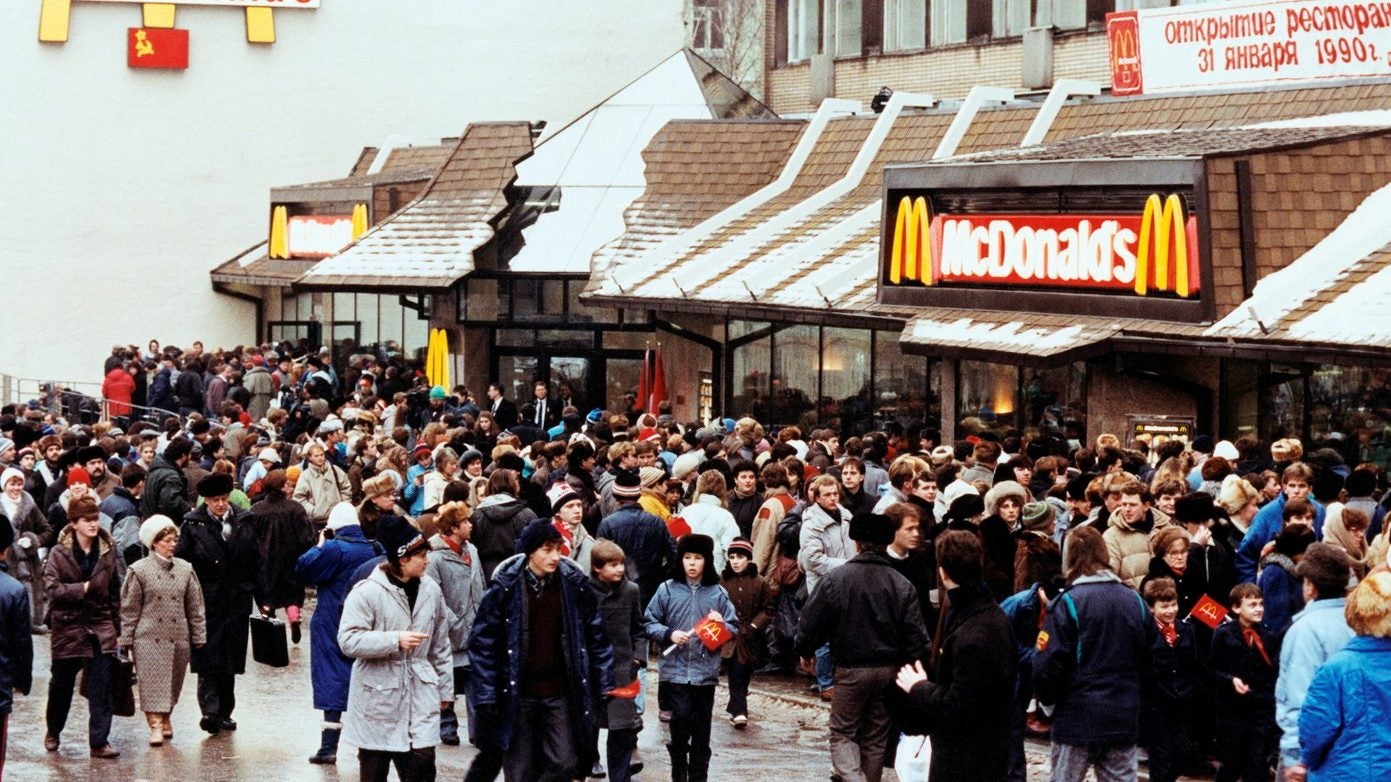Russia’s regression to the Soviet era, as told through the Big Mac
This week, when McDonald’s and Coca-Cola suspended their sales in Russia over its invasion of Ukraine, the country slid back towards the Soviet era, a time of isolation, scarcity, and a controlled economy.


This week, when McDonald’s and Coca-Cola suspended their sales in Russia over its invasion of Ukraine, the country slid back towards the Soviet era, a time of isolation, scarcity, and a controlled economy.
Not that greasy hamburgers and sickly-sweet soda are necessary or even desirable in any thriving democratic market—although there certainly was a theory, once, that no two countries with McDonald’s outlets would ever go to war with each other. (For economies with McDonald’s outlets—economies plugged into the global market—conflict would play such havoc with international trade and finance that such countries would prefer to avoid war altogether, the theory argued.) Rather, it’s the symbolism attached to the arrival of McDonald’s and Coke into Russia that is now evaporating in the thick of Vladimir Putin’s war on Ukraine.
The first McDonald’s in Russia was a public event
In one reading, the opening of the first Russian McDonald’s, in January 1990, signaled the definitive end of the Soviet Communism. In the late 1970s, the Politburo had rejected the overtures of McDonald’s executives, but by 1990, the Soviet Union had swung into glasnost: opening itself up to the world’s ideas and products. And to foreign trade and investment as well: McDonald’s spent $50 million to import potato seed and factory equipment into Russia, to try to make its burgers and fries taste as similar to those in the US as possible.
Its success wasn’t a foregone conclusion; in fact, it was something of a litmus test, to see how hospitable the fast-reforming Soviet Union could be to businesses. Stanislav Kondrashev, a popular columnist for the Russian newspaper Izvestia, thought that Soviet corruption would doom the enterprise. “I do not exclude the possibility that, in six months, McDonald’s will run away from the most ambitious project in history,” he wrote at the time. “The manager will be lifted out by helicopter, straight from the roof of the cafeteria, just as American diplomats were lifted out of the US embassy in Saigon.”
But McDonald’s lasted. On Jan. 30, 1990—opening day—long queues formed outside the new 900-seat restaurant in Pushkin Square. Security personnel had to keep order. Television crews filmed everything. A Big Mac cost 3.75 rubles, at a time when average income in Moscow was around 220 rubles a month. When McDonald’s placed a newspaper ad to fill jobs, promising a salary of 1.5 rubles an hour, 27,000 people applied.
Putin is driving Russia back into the Soviet era
The promise of McDonald’s, then, was not the promise of burgers. The brand signified a greater engagement with the world, a more open economy, more choice, more income, and more democracy.
These are precisely the qualities that Russia is now rapidly losing. Sanctions and international censure are isolating Russia once again. Its democratic credentials, which had already eroded under Putin, are dwindling further still, especially in light of a new law criminalizing journalism that contradicts the government. And if the government bans commodity exports, the Russian economy will constrict and shrink even more.
Putin is a known nostalgist: a man who yearns so much for the lost glories of his country that his grab for Ukraine is part of his bid to yank Russia back into some fabled, magnificent past. Instead, he is merely reviving the narrow, grim, penurious times of a few decades ago.